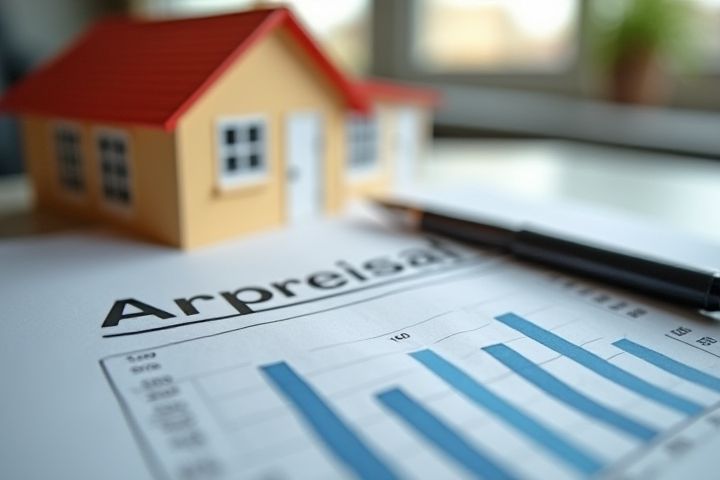
If you believe your home appraisal undervalues your property, consider appealing within the timeframe provided by your lender, typically within a few days following the appraisal report. Gather supporting documentation, such as recent comparable sales or improvements made to your home, to strengthen your case. It's beneficial to present this information in a clear format, including photos and details of upgrades. Engaging a local real estate expert can provide valuable insight and further evidence to support your appeal. Remember, a successful appeal can significantly impact your loan terms and future equity growth.
When To Appeal A House Appraisal
Significant discrepancies in comparable properties
If you notice significant discrepancies in the appraisal report compared to similar properties in your area, it's time to consider an appeal. This includes factors like square footage, number of bedrooms, and overall condition of the homes, which can drastically affect property values. For example, if your home features 2,500 square feet but the appraiser used a comparable that is only 2,000 square feet, this could lead to an undervaluation of your home. Gather data from properties sold in the last six months, including sale prices and features, to support your appeal effectively.
Inaccurate square footage measurement
If your house appraisal indicates inaccurate square footage measurements, it's critical to act promptly. Begin by thoroughly reviewing the appraisal report and comparing the listed square footage with your own measurements. You should gather supporting documentation, such as property maps or architectural blueprints, to substantiate your claim. File your appeal with the appropriate lending institution or appraisal board, presenting your evidence clearly to facilitate a re-evaluation.
Overlooked home improvements or upgrades
You should consider appealing a house appraisal if you have made overlooked home improvements or upgrades that significantly enhance your property's value. Common upgrades such as remodeled kitchens, updated bathrooms, or energy-efficient windows can dramatically affect market worth yet may not be fully reflected in the initial appraisal. Documenting these enhancements with receipts, photographs, and professional assessments can strengthen your case during the appeal process. By presenting compelling evidence of your home's true value, you increase the likelihood of receiving a revised appraisal that accurately reflects your investment.
Downward market trends not considered
A house appraisal may be grounds for appeal if downward market trends were overlooked, leading to an inflated valuation. You should gather evidence such as recent sales data for comparable properties that illustrate declining prices in your area. Additionally, documenting any market fluctuations, such as increasing foreclosure rates or declining buyer interest, can strengthen your case. Ensure to submit your appeal within the designated time frame set by your lender or appraisal management company to facilitate a timely review.
Unaddressed neighborhood developments or amenities
You should consider appealing a house appraisal if there are unaddressed neighborhood developments or amenities that could significantly enhance the property's value. For instance, if new parks, schools, or shopping centers have been established within a 1-2 mile radius, these factors can elevate the desirability of your location. Similarly, if comparable homes in your area have recent upgrades or improvements, this could also warrant a reevaluation. Ensuring that your appraisal reflects the latest changes in the neighborhood is crucial for achieving an accurate property value.
Incomplete or outdated property records
An appeal for a house appraisal is advisable when you discover incomplete or outdated property records that could negatively influence the valuation. For example, if recent renovations or enhancements--such as updated kitchens or new roofs--aren't reflected in the appraisal documents, it can lead to an undervaluation. Data indicates that homes with complete and accurate records can fetch at least 10-15% more in market value. You should gather all relevant documentation, including permits and receipts, to strengthen your case during the appeal process.
Recent appraisal or market analysis conflicts
When facing discrepancies between a recent appraisal and current market analysis, you should consider an appeal if the appraisal is significantly lower than comparable sales in your area. For instance, if your home was appraised at $300,000, yet recent sales of similar properties are averaging $350,000, this difference warrants further examination. Collecting data from the last three to six months of local sales can strengthen your case. You can also enlist a real estate agent for an in-depth market analysis to present solid evidence during the appeal process.
Errors in property condition assessment
When you notice discrepancies in a property condition assessment during a house appraisal, it's crucial to appeal within the typical 30-day period. Common errors may include inaccurate descriptions of the property's condition, omitted features like recent renovations, or overlooked negative aspects, such as structural issues. A well-documented appeal should highlight these inconsistencies by providing photographic evidence or repair receipts, which could significantly alter your property's assessed value. Ensuring that the appraisal reflects your home's true condition can save you thousands in mortgage costs and impact your equity growth significantly.
Changes in the local real estate market
Appealing a house appraisal becomes crucial when there are significant changes in the local real estate market that affect property values. If recent home sales in your neighborhood reflect higher values than your appraisal, documenting these comparable sales can strengthen your case. It's also important to consider any improvements made to your property that may not have been accounted for, as these enhancements can influence its market worth. Monitor market trends closely, including shifts in demand or new developments, to determine the optimal timing for your appeal.
Inappropriate selection of comparables
You should consider appealing a house appraisal if you believe the appraiser employed inappropriate comparables that inaccurately reflect your property's market value. For instance, if the chosen comparables are significantly smaller, older, or in less desirable neighborhoods, it can lead to an undervaluation of your property. It's crucial to gather evidence, such as recent sale prices of similar homes in more appropriate locations and with comparable features, to support your claim. A well-documented appeal, demonstrating these discrepancies, can help achieve a more accurate assessment of your home's worth.
